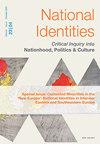Introduction
IF 0.7
Q3 POLITICAL SCIENCE
引用次数: 0
Abstract
Political analysis is replete with multiple vindications of the importance of informationladen dimension to the conflictual interactions between Russia and its European neighbors. However, academic conceptualizations vary in content and look more diverse. Some scholars prefer to categorize the issue under consideration as part of the fake news phenomenon (Tandoc et al., 2018) and deploy it in a wider scholarly debate on post-truth society. Others are more sympathetic with using the concept of hybrid warfare and the ensuing weaponization of information (Dash, 2019), which was instrumental in the appearance of a new field of study at the intersection of Russia’s compatriot policy and security studies (Pigman, 2019). A more neutral concept of information disorder (Wardle, 2018) includes deliberate spread of disinformation, intentionally inaccurate posts and comments, and manufactured forms of online solidarity. Anyhow, regardless of varied academic qualifications, the Habermasian ideal of communicative power seemed to turn into its opposite – miscommunication, disinformation, propaganda, and various manipulative techniques. Despite the lack of consensual approaches, the ongoing debate raises a number of important questions – for example, ‘whether the Internet can be home to a new form of political realm?’ (Smith, 2015, p. 241). Again, answers vary. Some scholars point to geopolitics as a relevant academic frame for discussing the proliferation of biased and fabricated information (Barthel & Bürkner, 2019) that might ‘shake the legitimacy of the neoliberal international order’ (Gerbaudo, 2018, p. 746). Others accentuate the biopolitical facets of the debate with their ‘anti-political thrust meant to lock people into their bodies as discriminatory and classificatory identities, thus disqualifying people from the political realm on account of the body’ (Smith, 2015, p. 250). Another key element of de-politicization is a phenomenon dubbed neutrollization, ‘a radical intervention to preserve “politics without telos”’, bent on a strategy of ‘producing meaninglessness’ and thus ‘precluding the very possibility of meaning’, and ‘eroding willingness to contribute to online political debate’ (Kurowska & Reshetnikov, 2018, p. 346). In particular, this approach can be used as an explanatory factor for the global phenomenon of populism. However, the academic narratives in this realm still suffer from excessive overgeneralization, which is particularly unfortunate when it comes to discussing measures of countering Russian politics of disinformation. In fact, Russia’s subjectivity in this political sphere is quite lucid and well documented (Orttung & Nelson, 2018; Mejias & Vokuev, 2017; Pomerantsev, 2015); disagreements concern only modalities of interference – direct (Kremlin-controlled) or indirect (outsourced to proxies), mass-scale with lavish centralized介绍
政治分析充分证明了信息维度对俄罗斯与其欧洲邻国之间冲突互动的重要性。然而,学术概念在内容上各不相同,看起来也更加多样化。一些学者倾向于将正在考虑的问题归类为假新闻现象的一部分(Tandoc et al.,2018),并将其部署在关于后真相社会的更广泛的学术辩论中。其他人更同情使用混合战争的概念和随之而来的信息武器化(Dash,2019),这有助于在俄罗斯同胞政策和安全研究的交叉点上出现一个新的研究领域(Pigman,2019)。信息混乱的一个更中性的概念(Wardle,2018)包括故意传播虚假信息、故意不准确的帖子和评论,以及制造的网络团结形式。无论如何,无论学历如何,哈贝马斯的沟通能力理想似乎变成了相反的东西——沟通失误、虚假信息、宣传和各种操纵技巧。尽管缺乏协商一致的方法,但正在进行的辩论提出了许多重要问题——例如,“互联网是否可以成为一种新形式的政治领域的家园?”(Smith,2015,第241页)。同样,答案各不相同。一些学者指出,地缘政治是讨论有偏见和捏造信息泛滥的相关学术框架(Barthel&Bürkner,2019),这些信息可能“动摇新自由主义国际秩序的合法性”(Gerbaudo,2018,第746页)。其他人则强调了这场辩论的生物政治方面,他们的“反政治推力旨在将人们锁定在自己的身体中,作为歧视性和分类性的身份,从而使人们因身体而失去政治领域的资格”(Smith,2015,p.250)。去政治化的另一个关键因素是一种被称为中性化的现象,“一种激进的干预,以维护“没有telos的政治”,致力于“产生无意义”的策略,从而“排除意义的可能性”,并“削弱参与在线政治辩论的意愿”(Kurowska&Reshetnikov,2018,第346页)。特别是,这种方法可以作为民粹主义全球现象的一个解释因素。然而,这一领域的学术叙事仍然存在过度概括的问题,这在讨论对抗俄罗斯虚假信息政治的措施时尤其不幸。事实上,俄罗斯在这一政治领域的主观性是非常清晰和有充分记录的(Ortung&Nelson,2018;Mejias&Vokuev,2017;波美拉采夫,2015);分歧只涉及干涉的方式——直接(克里姆林宫控制)或间接(外包给代理人)、大规模和过度集中
本文章由计算机程序翻译,如有差异,请以英文原文为准。
求助全文
约1分钟内获得全文
求助全文
来源期刊

NATIONAL IDENTITIES
POLITICAL SCIENCE-
CiteScore
1.70
自引率
0.00%
发文量
37
期刊介绍:
National Identities explores the formation and expression of national identity from antiquity to the present day. It examines the role in forging identity of cultural (language, architecture, music, gender, religion, the media, sport, encounters with "the other" etc.) and political (state forms, wars, boundaries) factors, by examining how these have been shaped and changed over time. The historical significance of "nation"in political and cultural terms is considered in relationship to other important and in some cases countervailing forms of identity such as religion, region, tribe or class. The focus is on identity, rather than on contingent political forms that may express it. The journal is not prescriptive or proscriptive in its approach.
 求助内容:
求助内容: 应助结果提醒方式:
应助结果提醒方式:


